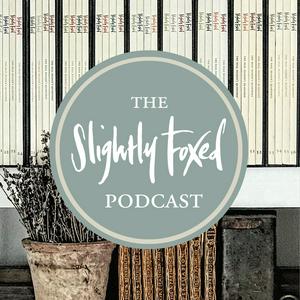There has never been a literary family quite like the Brontës. In our autumn podcast Ann Dinsdale, Principal Curator of the Brontë Parsonage Museum at Haworth in Yorkshire, joined the Slightly Foxed team to discuss the story of the family’s life there.
The Brontës moved to Haworth in 1820 when Patrick Brontë became curate, and the parsonage was established as a museum in 1928 when it was acquired by the Brontë Society. Mrs Brontë and the oldest two daughters, Maria and Elizabeth, died there from tuberculosis, leaving Charlotte, Emily, Anne and their brother Branwell to be educated at home by their widowed father.
Ann talks about her work at the Parsonage Museum, a treasure trove of Brontë memorabilia, containing 9,000 items including clothes, letters, first editions and the sisters’ own writing boxes. The Brontës were a close-knit family, sharing their games and creating a rich imaginary world which formed the basis of their later writing. Patrick Brontë was a loving and in many ways an unconventional father, who encouraged the girls’ education and allowed them to read freely. He was a lover of the natural world, and on their daily walks in the wild moorland country around Haworth the sisters absorbed the atmosphere that would permeate their novels.
Recognition came in 1847 when each published a novel, though initially they hid behind the pseudonyms of Currer, Ellis and Acton Bell. Charlotte’s Jane Eyre was the first, an overnight sensation which was the talk of literary London, causing endless speculation about the identity of its author. Three months later came Emily’s Wuthering Heights, which shocked readers with its story of passion, violence and revenge, and finally Anne’s Agnes Grey. The scene could have been set for brilliant literary careers, but within two years both Emily and Anne were dead from tuberculosis, Emily at 30 and Anne at 29. Charlotte married her father’s curate, lived on to write Shirley and Villette, based on her time as a teacher in a school in Brussels, and died at 38. Branwell, who never fulfilled his family’s high expectations, died addicted to alcohol and opium when he was 31.
Even before Charlotte’s death Haworth had become a place of pilgrimage for Brontë fans, and Mrs Gaskell’s 1857 biography of her helped to establish the family’s lasting fame. Today the Parsonage Museum is hugely popular with visitors. It is also a centre for research and runs an annual festival of women’s writing. Ann’s deep knowledge of the Brontës and her experience of running the museum made for a fascinating discussion, leaving us to wonder, had the sisters lived longer, what their eventual literary legacy might have been.
Autumn book recommendations were Blythe Spirit, Ian Collins’s biography of Ronald Blythe, The Brothers York by Thomas Penn, Plainsong, an American novel by Kent Haruf, Traitor’s Legacy by S. J. Parris, and The Land in Winter by Andrew Miller.
For episode show notes, please see the Slightly Foxed website.
Opening music: Preludio from Violin Partita No. 3 in E Major by Bach
Hosted by Rosie Goldsmith
Produced by Philippa Goodrich


